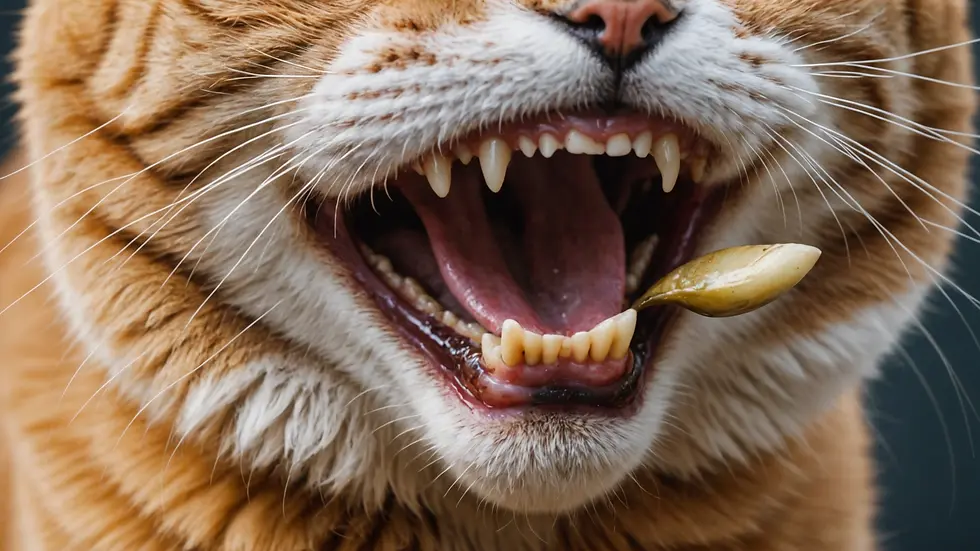Exploring the Key Considerations for Dental Health in Senior Cats
- Jyotiraj Borah
- Feb 7
- 4 min read
Caring for our feline friends is a rewarding experience, especially as they grow older. One essential area that often needs our attention is their dental health. Senior cats are particularly vulnerable to dental problems that can lead to significant pain and even affect their overall health. Discovering how to prevent and address these issues will ensure our furry companions enjoy a comfortable and fulfilling life.
Dental health in senior cats frequently goes unnoticed, leading to severe issues that many pet owners may not recognize right away. This post takes a close look at critical aspects of dental health for senior cats, including common diseases, preventive measures, signs of dental problems, and effective treatment options.
Understanding Common Dental Diseases in Senior Cats
As cats age, they can develop various dental diseases, primarily due to plaque and tartar buildup. Here are some prevalent dental diseases seen in senior felines:
Periodontal Disease
Periodontal disease is a common issue for cats, affecting approximately 80% of cats over three years old. It starts when plaque accumulates, leading to gingivitis or gum inflammation. If not treated promptly, it can progress to more severe conditions, risking tooth loss and causing pain.
In the early stages, signs may be subtle or even non-existent. Therefore, regular veterinary visits are critical for identifying this condition before it worsens and significantly impacts the cat's quality of life.
Tooth Resorption
Tooth resorption, a painful condition where the body breaks down tooth structure, is notably more frequent in cats than dogs. Estimates suggest that about 60% of cats over six years old will experience some degree of tooth resorption, which can lead to severe discomfort.
Symptoms may include difficulty eating, excessive chewing, or vocalizations that indicate pain. A veterinarian will conduct a thorough examination, often using dental imaging for accurate diagnosis.
Stomatitis
Stomatitis, a severe inflammation of the mouth and gums, is more common in senior cats due to their weakened immune systems. Symptoms can include swollen gums, painful sores, and difficulty with eating and drinking.
In chronic cases, treatment may require medication, and sometimes extraction of teeth may be necessary to alleviate discomfort.

The Importance of Regular Dental Check-ups
Regular veterinary dental check-ups are vital in maintaining a senior cat's oral health. Research indicates that early detection of dental issues can improve treatment outcomes by over 60%. These visits provide an opportunity to monitor changes in dental health and intervene if necessary.
During these check-ups, a veterinarian examines the teeth and gums for signs of plaque, inflammation, and general dental health.
In addition to professional check-ups, pet owners should engage in at-home dental care practices, such as daily brushing and providing oral health treats for cats.
Recognizing Signs of Dental Problems
Being able to recognize dental issues is key to ensuring timely veterinary care. Common indicators that may suggest dental problems include:
Change in Eating Habits
If your cat suddenly prefers softer food or has trouble chewing, it could signify dental discomfort. Regularly observing your cat's eating patterns is essential for identifying changes.
Bad Breath
While cats naturally have a distinct smell, persistent bad breath, known as halitosis, can indicate dental issues such as gum disease or infections.
Excessive Drooling or Pawing at the Mouth
Senior cats in pain may drool more than usual or frequently paw at their mouths, signaling discomfort.
Behavioral Changes
Subtle shifts in behavior, like increased agitation, withdrawal from social interactions, or reduced playfulness, may indicate underlying dental pain.

Preventive Measures for Dental Health
Preventive care can significantly decrease the risk of dental disease in senior cats. Effective strategies include:
Regular Brushing
Brushing your cat's teeth a few times weekly can help prevent plaque buildup. It is recommended to use specially formulated toothpaste for cats and soft-bristled toothbrushes.
Dental Treats and Toys
Giving dental chews or toys can aid in cleaning your cat’s teeth naturally. Many of these products are designed to help reduce plaque while also keeping your cat entertained.
Water Additives
Using water additives can also promote oral health by reducing bacterial growth in the mouth. Incorporating these products into your cat’s routine is an easy way to support dental hygiene.
Dietary Considerations
The type of food your senior cat eats plays a significant role in their dental health. High-quality food designed for oral health can offer various advantages.
Dry vs. Wet Food
Debates often arise about the benefits of dry versus wet food. Dry food may help reduce plaque through chewing, while wet foods ensure adequate hydration. Individual health needs will ultimately determine which option is best.
Dental-Specific Diets
Brands exist that offer specialized diets aimed at dental health. These diets feature uniquely shaped kibbles designed to help scrub teeth during chewing. Consulting with your veterinarian can help establish a suitable diet for your senior cat.

Treatment Options for Dental Diseases
If any dental problems are identified, treatment plans will depend on the severity of the disease. Common interventions include:
Dental Cleanings
Veterinary dental cleanings involve professional scaling to remove plaque and tartar both above and below the gum line. This often requires anesthesia, especially for senior cats who might not cooperate if awake.
Tooth Extraction
In cases where periodontal disease or tooth resorption is advanced, tooth extraction may be necessary. Removing painful teeth often results in an immediate improvement in the cat's quality of life.
Medications
Veterinarians may prescribe pain relief and anti-inflammatory medications to help manage discomfort. Antibiotics are also commonly needed to treat infections in more severe cases.
Ensuring a Happy, Healthy Life for Senior Cats
Maintaining dental health in senior cats is critical for their overall well-being. By being aware of common dental diseases, recognizing signs of potential issues, and implementing preventive measures, pet owners can significantly enhance their furry friends' lives.
Regular check-ups and proactive home care, such as brushing and providing dental-friendly foods, contribute effectively to oral health. By prioritizing dental care, cat owners can help their older cats stay comfortable, active, and happy for many years. A healthy mouth not only supports a cat's dental health but also ensures they lead a joyful life.




Comentarios